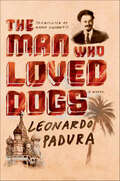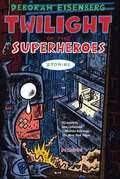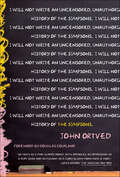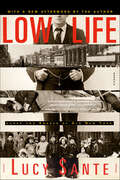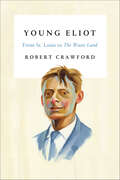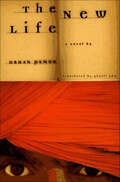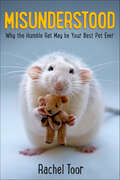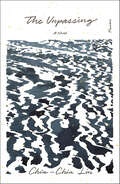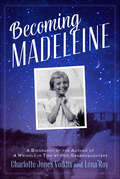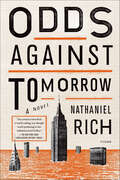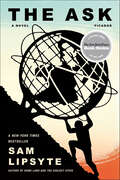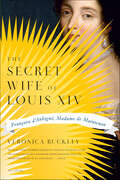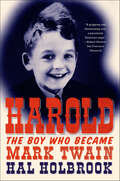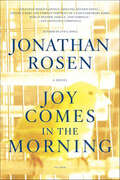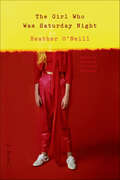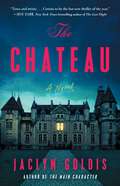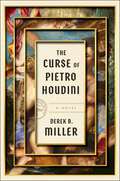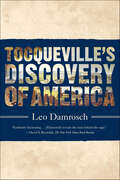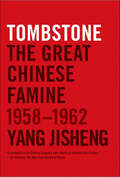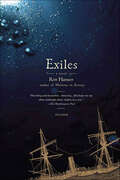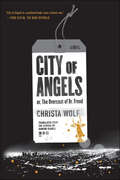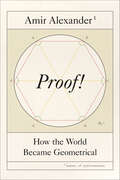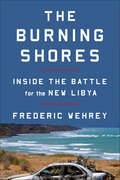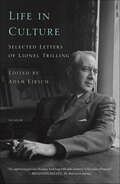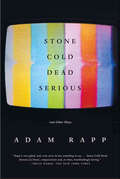- Table View
- List View
The Man Who Loved Dogs: A Novel
by Leonardo PaduraA gripping novel about the assassination of Leon Trotsky in Mexico City in 1940In The Man Who Loved Dogs, Leonardo Padura brings a noir sensibility to one of the most fascinating and complex political narratives of the past hundred years: the assassination of Leon Trotsky by Ramón Mercader.The story revolves around Iván Cárdenas Maturell, who in his youth was the great hope of modern Cuban literature—until he dared to write a story that was deemed counterrevolutionary. When we meet him years later in Havana, Iván is a loser: a humbled and defeated man with a quiet, unremarkable life who earns his modest living as a proofreader at a veterinary magazine. One afternoon, he meets a mysterious foreigner in the company of two Russian wolfhounds. This is "the man who loved dogs," and as the pair grow closer, Iván begins to understand that his new friend is hiding a terrible secret.Moving seamlessly between Iván's life in Cuba, Ramón's early years in Spain and France, and Trotsky's long years of exile, The Man Who Loved Dogs is Padura's most ambitious and brilliantly executed novel yet. This is a story about political ideals tested and characters broken, a multilayered epic that effortlessly weaves together three different plot threads— Trotsky in exile, Ramón in pursuit, Iván in frustrated stasis—to bring emotional truth to historical fact.A novel whose reach is matched only by its astonishing successes on the page, The Man Who LovedDogs lays bare the human cost of abstract ideals and the insidious, corrosive effects of life under a repressive political regime.
Twilight of the Superheroes: Stories
by Deborah EisenbergDeborah Eisenberg is nearly unmatched in her mastery of the short-story form. Now, in her newest collection, she demonstrates once again her virtuosic abilities in precisely distilled, perfectly shaped studies of human connection and disconnection. From a group of friends whose luck in acquiring a luxurious Manhattan sublet turns to disaster as their balcony becomes a front-row seat to the catastrophe of 9/11; to the Roman holiday of a schoolteacher running away from the news of her ex-husband's life-threatening illness, and her unlikely guide, a titled art scout in desperate revolt against his circumstances and aging; to the too painful love of a brother for his schizophrenic sister, whose tragic life embitters him to the very idea of family, Eisenberg evokes "intense, abundant human lives" in which "everything that happens is out there waiting for you to come to it."
The Simpsons: An Uncensored, Unauthorized History
by John OrtvedThe Simpsons is one of the most successful shows to ever run on television. From its first moment on air, the series's rich characters, subversive themes, and layered humor resounded deeply with audiences both young and old who wanted more from their entertainment than what was being meted out at the time by the likes of Full House, Growing Pains, and Family Matters. Spawned as an animated short on The Tracy Ullman Show—mere filler on the way to commercial breaks—the series grew from a controversial cult favorite to a mainstream powerhouse, and after nineteen years the residents of Springfield no longer simply hold up a mirror to our way of life: they have ingrained themselves into it. John Ortved's oral history will be the first-ever look behind the scenes at the creation and day-to-day running of The Simpsons, as told by many of the people who made it: among them writers, animators, producers, and network executives. It's an intriguing yet hilarious tale, full of betrayal, ambition, and love. Like the family it depicts, the show's creative forces have been riven by dysfunction from the get-go—outsize egos clashing with studio executives and one another over credit for and control of a pop-culture institution. Contrary to popular belief, The Simpsons did not spring out of one man's brain, fully formed, like a hilarious Athena. Its inception was a process, with many parents, and this book tells the story.
Low Life: Lures and Snares of Old New York
by Lucy SanteLucy Sante's Low Life is a portrait of America's greatest city, the riotous and anarchic breeding ground of modernity. This is not the familiar saga of mansions, avenues, and robber barons, but the messy, turbulent, often murderous story of the city's slums; the teeming streets--scene of innumerable cons and crimes whose cramped and overcrowded housing is still a prominent feature of the cityscape.Low Life voyages through Manhattan from four different directions. Part One examines the actual topography of Manhattan from 1840 to 1919; Part Two, the era's opportunities for vice and entertainment--theaters and saloons, opium and cocaine dens, gambling and prostitution; Part Three investigates the forces of law and order which did and didn't work to contain the illegalities; Part Four counterposes the city's tides of revolt and idealism against the city as it actually was.Low Life provides an arresting and entertaining view of what New York was actually like in its salad days. But it's more than simply a book about New York. It's one of the most provocative books about urban life ever written--an evocation of the mythology of the quintessential modern metropolis, which has much to say not only about New York's past but about the present and future of all cities.
Young Eliot: From St. Louis to The Waste Land
by Robert CrawfordA groundbreaking new biography of one of the twentieth century's most important poetsOn the fiftieth anniversary of the death of T. S. Eliot, the award-winning biographer Robert Crawford presents us with the first volume of a comprehensive account of this poetic genius. Young Eliot traces the life of the twentieth century's most important poet from his childhood in St. Louis to the publication of his revolutionary poem The Waste Land. Crawford provides readers with a new understanding of the foundations of some of the most widely read poems in the English language through his depiction of Eliot's childhood—laced with tragedy and shaped by an idealistic, bookish family in which knowledge of saints and martyrs was taken for granted—as well as through his exploration of Eliot's marriage to Vivien Haigh-Wood, a woman who believed she loved Eliot "in a way that destroys us both." Quoting extensively from Eliot's poetry and prose as well as drawing on new interviews, archives, and previously undisclosed memoirs, Crawford shows how the poet's background in Missouri, Massachusetts, and Paris made him a lightning rod for modernity. Most impressively, Young Eliot reveals the way he accessed his inner life—his anguishes and his fears—and blended them with his omnivorous reading to create his masterpieces "The Love Song of J. Alfred Prufrock" and The Waste Land. At last, we experience T. S. Eliot in all his tender complexity as student and lover, penitent and provocateur, banker and philosopher—but most of all, Young Eliot shows us as an epoch-shaping poet struggling to make art among personal disasters.
The New Life: A Novel
by Orhan PamukOsman is a young university student whose life is changed by a chance encounter with a mysterious book. Osman becomes obsessed with the book, which seems to contain all the magic and power of life and love. Romantic and elusive, Orhan Pamuk's The New Life is a rhapsody to love and an investigation into the shadowy nature of self.
Misunderstood: Why the Humble Rat May Be Your Best Pet Ever
by Rachel ToorAs much a moving memoir as it is an amusing pet manual, Misunderstood is a unique nonfiction book for teens and tweens about domesticated rats in general and a wonderful rat named Iris in particular. Brimming with smarts and energy just like its furry subjects, Rachel Toor's text blends history and science with profiles of interesting people and autobiographical anecdotes as it joyfully sets the record straight about why this reviled creature is actually a most amazing species. Readers will come away with a deeper understanding and appreciation of domestic rats—and may be convinced to adopt one themselves.
The Unpassing: A Novel
by Chia-Chia LinFinalist for the 2019 NBCC John Leonard Prize for Best First Book. Shortlisted for the Center for Fiction's First Novel Prize. One of Entertainment Weekly's 10 Best Debut Novels of 2019. Named one of the Best Books of 2019 by TIME, The Washington Post, and Esquire. A New York Times Book Review Editors' Choice."A singularly vast and captivating novel . . . What makes Lin’s novel such an important book is the extent to which it probes America’s mythmaking about itself." --The New York Times Book ReviewA searing debut novel that explores community, identity, and the myth of the American dream through an immigrant family in AlaskaIn Chia-Chia Lin’s debut novel, The Unpassing, we meet a Taiwanese immigrant family of six struggling to make ends meet on the outskirts of Anchorage, Alaska. The father, hardworking but beaten down, is employed as a plumber and repairman, while the mother, a loving, strong-willed, and unpredictably emotional matriarch, holds the house together. When ten-year-old Gavin contracts meningitis at school, he falls into a deep, nearly fatal coma. He wakes up a week later to learn that his little sister Ruby was infected, too. She did not survive. Routine takes over for the grieving family: the siblings care for each other as they befriend a neighboring family and explore the woods; distance grows between the parents as they deal with their loss separately. But things spiral when the father, increasingly guilt ridden after Ruby’s death, is sued for not properly installing a septic tank, which results in grave harm to a little boy. In the ensuing chaos, what really happened to Ruby finally emerges.With flowing prose that evokes the terrifying beauty of the Alaskan wilderness, Lin explores the fallout after the loss of a child and the way in which a family is forced to grieve in a place that doesn’t yet feel like home. Emotionally raw and subtly suspenseful, The Unpassing is a deeply felt family saga that dismisses the American dream for a harsher, but ultimately more profound, reality.
Becoming Madeleine: A Biography of the Author of A Wrinkle in Time by Her Granddaughters
by Charlotte Jones Voiklis Léna RoyThis middle-grade biography explores the life and works of Madeleine L'Engle —written by her granddaughters.This elegant and insightful biography of Madeleine L’Engle (1918–2007) was written by her granddaughters, Charlotte Jones Voiklis and Léna Roy. Using never-before-seen archival materials that include photographs, poems, letters, and journal entries from when Madeleine was a child until just after the publication of her classic, A Wrinkle in Time, her granddaughters weave together an in-depth and unique view of the famous writer. It is a story of overcoming obstacles—a lonely childhood, financial insecurity, and countless rejections of her writing—and eventual triumph. Becoming Madeleine will speak not only to fans of the icon’s work, but also to anyone interested in writing.This title has Common Core connections.
Odds Against Tomorrow: A Novel
by Nathaniel RichNEW YORK CITY, the near future: Mitchell Zukor, a gifted young mathematician, is hired by a mysterious new financial consulting firm, FutureWorld. The business operates out of a cavernous office in the Empire State Building; Mitchell is employee number two. He is asked to calculate worst-case scenarios in the most intricate detail, and his schemes are sold to corporations to indemnify them against any future disasters. This is the cutting edge of corporate irresponsibility, and business is booming.As Mitchell immerses himself in the mathematics of catastrophe—ecological collapse, global war, natural disasters—he becomes obsessed by a culture's fears. Yet he also loses touch with his last connection to reality: Elsa Bruner, a friend with her own apocalyptic secret, who has started a commune in Maine. Then, just as Mitchell's predictions reach a nightmarish crescendo, an actual worst-case scenario overtakes Manhattan. Mitchell realizes he is uniquely prepared to profit. But at what cost?At once an all-too-plausible literary thriller, an unexpected love story, and a philosophically searching inquiry into the nature of fear, Nathaniel Rich's Odds Against Tomorrow poses the ultimate questions of imagination and civilization. The future is not quite what it used to be.An NPR Best Book of 2013
The Ask: A Novel
by Sam LipsyteFrom the author of Home Land and Venus Drive comes Sam Lipsyte'ssearing, beautiful, and deeply comic novel, The Ask.A New York Times Book Review Editors' Choice Milo Burke, a development officer at a third-tier university, has "not been developing": after a run-in with a well-connected undergrad, he finds himself among the burgeoning class of the newly unemployed. Grasping after odd jobs to support his wife and child, Milo is offered one last chance by his former employer: he must reel in a potential donor—a major "ask"—who, mysteriously, has requested Milo's involvement. But it turns out that the ask is Milo's sinister college classmate Purdy Stuart. And the "give" won't come cheap. Probing many themes— or, perhaps, anxieties—including work, war, sex, class, child rearing, romantic comedies, Benjamin Franklin, cooking shows on death row, and the eroticization of chicken wire, Sam Lipsyte's The Ask is a burst of genius by an author who has already demonstrated that the truly provocative and important fictions are often the funniest ones.
The Secret Wife of Louis XIV: Françoise d'Aubigné, Madame de Maintenon
by Veronica BuckleyFrançoise d'Aubigné, marquise de Maintenon and secret wife of the Sun King, Louis XIV, was born in a bleak French prison in 1635, her father a condemned traitor and murderer, her mother the warden's seduced daughter. A timely pardon and a hopeful Caribbean colonial venture failed to mend the family's fortunes, and Françoise was reduced to begging in the streets. Yet, armed with beauty, intellect, and shrewd judgment, she was to make her way to the center of power at Versailles, the most opulent and ambitious court in all Europe.At fifteen, she was married off to the forty-two-year-old satirical poet Paul Scarron, a former roué now grievously deformed by rheumatism—"a sort of human Z," as he described himself. Despite his ailments, Scarron presided over the liveliest and most scandalous literary salon in Paris, and Françoise quickly became its most prized ornament.After Scarron's death, she enjoyed a merry widowhood in the fashionable Marais district, in the company of the courtesan Ninon de Lenclos and the King's splendid mistress, Athénaïs de Montespan, who made the young widow governess to her brood of illegitimate children. The appointment transformed Françoise's life, but was fatal to the temperamental Athénaïs herself, with the King soon turning his attentions to the graceful governess. Françoise was raised to the nobility as Madame de Maintenon—and, unofficially, "Madame de Maintenant," the lady of the moment.The acclaimed biographer Veronica Buckley traces the extraordinary story of Françoise's progress from pauper child to salonnière to the compromised position of Louis's secret wife and uncrowned Queen. An absolute ruler, Louis turned away his many other mistresses to live with Françoise only, trusting her as his closest confidante and remaining in love with her for forty years.Sparkling with the irresistible wit of contemporary chroniclers such as Madame de Sévigné, this exactingly researched biography is a pinnacle of the form. In vibrant colors, The Secret Wife of Louis XIV paints a portrait of Europe in an age of violent change, and the Sun King's France in the process of becoming its modern self.
Harold: The Boy Who Became Mark Twain
by Hal HolbrookIn Harold: The Boy Who Became Mark Twain, the beloved stage, film, and television actor Hal Holbrook presents an affecting memoir about his struggle to discover his true self, even as he learned to transform himself onstage.Abandoned by his mother and father when he was two, Holbrook and his two sisters commenced separate journeys of survival. Raised by his powerful grandfather, who died when Holbrook was twelve, he spent his childhood at boarding schools, visiting his father in an insane asylum and hoping his mother would suddenly surface in Hollywood.As World War II engulfed Europe, Holbrook began acting almost by accident. Through war, marriage, and the work of honing his craft, his fear of insanity and his fearlessness in the face of risk were channeled into discovering that the riskiest path of all—success as an actor—would be his birthright. The climb up that forbidding mountain was a lonely one. And how he achieved it—the cost to his wife and children and to his own conscience—is the dark side of the fame he would eventually earn by portraying the man his career would forever be most closely associated with: Mark Twain.“If I were to conjure an image of an individual who best fits the phrase ‘a real American,’ it would be Hal Holbrook. This book shows him as a complete person. You will be compelled by the wit and wisdom of this beautifully composed story of self-determination and survival.”—Robert Redford
Joy Comes in the Morning: A Novel
by Jonathan RosenDeborah Green is a woman of passionate contradictions--a rabbi who craves goodness and surety while wrestling with her own desires and with the sorrow and pain she sees around her. Her life changes when she visits the hospital room of Henry Friedman, an older man who has attempted suicide. His parents were murdered in the Holocaust when he was a child, and all his life he's struggled with difficult questions. Deborah's encounter with Henry and his family draws her into a world of tragedy, frailty, love, and, finally, hope.
The Girl Who Was Saturday Night: A Novel
by Heather O'NeillAn enchanting story of twins, fame, and heartache by the much-praised author of Lullabies for Little CriminalsHeather O'Neill charmed readers in the hundreds of thousands with her sleeper hit, Lullabies for Little Criminals, which documented with a rare and elusive magic the life of a young dreamer on the streets of Montreal. Now, in The Girl Who Was Saturday Night, she returns to the grubby, enchanted city with a light and profound tale of the vice of fame and the ties of family.Nineteen years old, free of prospects, and inescapably famous, the twins Nicolas and Nouschka Tremblay are trying to outrun the notoriety of their father, a French-Canadian Serge Gainsbourg with a genius for the absurd and for winding up in prison. "Back in the day, he could come home from a show with a paper bag filled with women's underwear. Outside of Québec nobody had even heard of him, naturally. Québec needed stars badly."Since the twins were little, Étienne has made them part of his unashamed seduction of the province, parading them on talk shows and then dumping them with their decrepit grandfather while he disappeared into some festive squalor. Now Étienne is washed up and the twins are making their own almost-grown-up messes, with every misstep landing on the front pages of the tabloid Allo Police. Nouschka not only needs to leave her childhood behind; she also has to leave her brother, whose increasingly erratic decisions might take her down with him.
The Chateau: A Novel
by Jaclyn GoldisA dream girls trip to a luxurious French chateau devolves into a deadly nightmare of secrets and lies in this &“twisty, well-paced murder mystery that never fully lets go&” (Sarah Penner, New York Times bestselling author). Welcome to picturesque Provence, where the Lady of the Chateau, Séraphine Demargelasse, has opened its elegant doors to her granddaughter Darcy and her three friends. Twenty years earlier, the four girlfriends studied abroad together in France and visited the old woman on the weekends, creating the group&’s deep bond. But why this sudden invitation? Amid winery tours, market visits, and fancy dinners overlooking olive groves and lavender fields, it becomes clear that each woman has a hidden reason for returning to the estate after all these years. Then, following a wild evening&’s celebration, Séraphine is found brutally murdered. In the midst of this shocking crime, a sinister Instagram account pops up, exposing snapshots from the friends&’ intimate moments at the chateau, while threatening to reveal more. As they race to uncover who murdered Séraphine—and is now stalking them—the friends begin to suspect each other. Because the chateau houses many secrets…several worth killing for in this &“mesmerizing story of betrayal and revenge&” (Megan Collins, author of The Family Plot).
The Curse of Pietro Houdini: A Novel
by Derek B. MillerFrom the Dagger Award–winning author of Norwegian by Night comes a vivid, thrilling, and moving World War II art-heist-adventure tale where enemies become heroes, allies become villains, and a child learns what it means to become an adult—for fans of All the Light We Cannot See.August, 1943. Fourteen-year-old Massimo is all alone. Newly orphaned and fleeing from Rome after surviving the American bombing raid that killed his parents, Massimo is attacked by thugs and finds himself bloodied at the base of the Montecassino. It is there in the Benedictine abbey&’s shadow that a charismatic and cryptic man calling himself Pietro Houdini, the self-proclaimed &“Master Artist and confidante of the Vatican,&” rescues Massimo and brings him up the mountain to serve as his assistant in preserving the treasures that lay within the monastery walls. But can Massimo believe what Pietro is saying, particularly when Massimo has secrets too? Who is this extraordinary man? When it becomes evident that Montecassino will soon become the front line in the war, Pietro Houdini and Massimo execute a plan to smuggle three priceless Titian paintings to safety down the mountain. They are joined by a nurse concealing a nefarious past, a café owner turned murderer, a wounded but chipper German soldier, and a pair of lovers along with their injured mule, Ferrari. Together they will lie, cheat, steal, fight, kill, and sin their way through battlefields to survive, all while smuggling the Renaissance masterpieces and the bag full of ancient Greek gold they have rescued from the &“safe keeping&” of the Germans. Heartfelt, powerfully engaging, and in the tradition of City of Thieves by David Benioff, The Curse of Pietro Houdini is a work of storytelling bravado: a thrilling action-packed adventure heist, an imaginative chronicle of forgotten history, and a philosophical coming-of-age epic where a child navigates one of the most enigmatic and morally complex fronts of World War II and lives to tell the tale.
Tocqueville's Discovery of America
by Leo DamroschAlexis de Tocqueville is more quoted than read; commentators across the political spectrum invoke him as an oracle who defined America and its democracy for all times. But in fact his masterpiece, Democracy in America, was the product of a young man's open-minded experience of America at a time of rapid change. In Tocqueville's Discovery of America, the prizewinning biographer Leo Damrosch retraces Tocqueville's nine-month journey through the young nation in 1831–1832, illuminating how his enduring ideas were born of imaginative interchange with America and Americans, and painting a vivid picture of Jacksonian America.Damrosch shows that Tocqueville found much to admire in the dynamism of American society and in its egalitarian ideals. But he was offended by the ethos of grasping materialism and was convinced that the institution of slavery was bound to give rise to a tragic civil war.Drawing on documents and letters that have never before appeared in English, as well as on a wide range of scholarship, Tocqueville's Discovery of America brings the man, his ideas, and his world to startling life.
Tombstone: The Great Chinese Famine, 1958–1962
by Yang JishengThe much-anticipated definitive account of China's Great FamineAn estimated thirty-six million Chinese men, women, and children starved to death during China's Great Leap Forward in the late 1950s and early '60s. One of the greatest tragedies of the twentieth century, the famine is poorly understood, and in China is still euphemistically referred to as "the three years of natural disaster." As a journalist with privileged access to official and unofficial sources, Yang Jisheng spent twenty years piecing together the events that led to mass nationwide starvation, including the death of his own father. Finding no natural causes, Yang attributes responsibility for the deaths to China's totalitarian system and the refusal of officials at every level to value human life over ideology and self-interest. Tombstone is a testament to inhumanity and occasional heroism that pits collective memory against the historical amnesia imposed by those in power. Stunning in scale and arresting in its detailed account of the staggering human cost of this tragedy, Tombstone is written both as a memorial to the lives lost—an enduring tombstone in memory of the dead—and in hopeful anticipation of the final demise of the totalitarian system. Ian Johnson, writing in The New York Review of Books, called the Chinese edition of Tombstone "groundbreaking . . . One of the most important books to come out of China in recent years."
Exiles: A Novel
by Ron HansenWith Exiles, Ron Hansen tells the story of a notorious shipwreck that prompted Gerard Manley Hopkins to break years of "elected silence" with an outpouring of dazzling poetry. In December 1875 the steamship Deutschland left Bremen, bound for England and then America. On board were five young nuns who, exiled by Bismarck's laws against Catholic religious orders, were going to begin their lives anew in Missouri. Early one morning, the ship ran aground in the Thames and more than sixty lives were lost—including those of the five nuns. Hopkins was a Jesuit seminarian in Wales, and he was so moved by the news of the shipwreck that he wrote a grand poem about it, his first serious work since abandoning a literary career at Oxford to become a priest. He too would die young, an exile from the literary world. But as Hansen's gorgeously written account of Hopkins's life makes clear, he fulfilled his calling. Combining a thrilling tragedy at sea with the seeming shipwreck of Hopkins's own life, Exiles joins Hansen's Mariette in Ecstasy (called "an astonishingly deft and provocative novel" by The New York Times) as a novel that dramatizes the passionate inner search of religious life and makes it accessible to us in the way that only great art can.
City of Angels: or, The Overcoat of Dr. Freud, A Novel
by Christa WolfThe stunning final novel from East Germany's most acclaimed writerThree years after the fall of the Berlin Wall, the writer Christa Wolf was granted access to her newly declassified Stasi files. Known for her defiance and outspokenness, Wolf was not especially surprised to discover forty-two volumes of documents produced by the East German secret police. But what was surprising was a thin green folder whose contents told an unfamiliar—and disturbing—story: in the early 1960s, Wolf herself had been an informant for the Communist government. And yet, thirty years on, she had absolutely no recollection of it. Wolf's extraordinary autobiographical final novel is an account of what it was like to reckon with such a shocking discovery. Based on the year she spent in Los Angeles after these explosive revelations, City of Angels is at once a powerful examination of memory and a surprisingly funny and touching exploration of L.A., a city strikingly different from any Wolf had ever visited. Even as she reflects on the burdens of twentieth-century history, Wolf describes the pleasures of driving a Geo Metro down Wilshire Boulevard and watching episodes of Star Trek late at night. Rich with philosophical insights, personal revelations, and vivid descriptions of a diverse city and its citizens, City of Angels is a profoundly humane and disarmingly honest novel—and a powerful conclusion to a remarkable career in letters.
Proof!: How the World Became Geometrical
by Amir AlexanderAn eye-opening narrative of how geometric principles fundamentally shaped our worldOn a cloudy day in 1413, a balding young man stood at the entrance to the Cathedral of Florence, facing the ancient Baptistery across the piazza. As puzzled passers-by looked on, he raised a small painting to his face, then held a mirror in front of the painting. Few at the time understood what he was up to; even he barely had an inkling of what was at stake. But on that day, the master craftsman and engineer Filippo Brunelleschi would prove that the world and everything within it was governed by the ancient science of geometry.In Proof!, the award-winning historian Amir Alexander traces the path of the geometrical vision of the world as it coursed its way from the Renaissance to the present, shaping our societies, our politics, and our ideals. Geometry came to stand for a fixed and unchallengeable universal order, and kings, empire-builders, and even republican revolutionaries would rush to cast their rule as the apex of the geometrical universe. For who could doubt the right of a ruler or the legitimacy of a government that drew its power from the immutable principles of Euclidean geometry?From the elegant terraces of Versailles to the broad avenues of Washington, DC and on to the boulevards of New Delhi and Manila, the geometrical vision was carved into the landscape of modernity. Euclid, Alexander shows, made the world as we know it possible.
The Burning Shores: Inside the Battle for the New Libya
by Frederic WehreyA riveting, beautifully crafted account of Libya after Qadhafi.The death of Colonel Muammar Qadhafi freed Libya from forty-two years of despotic rule, raising hopes for a new era. But in the aftermath, the country descended into bitter rivalries and civil war, paving the way for the Islamic State and a catastrophic migrant crisis.In a fast-paced narrative that blends frontline reporting, analysis, and history, Frederic Wehrey tells the story of what went wrong. An Arabic-speaking Middle East scholar, Wehrey interviewed the key actors in Libya and paints vivid portraits of lives upended by a country in turmoil: the once-hopeful activists murdered or exiled, revolutionaries transformed into militia bosses or jihadist recruits, an aging general who promises salvation from the chaos in exchange for a return to the old authoritarianism. He traveled where few Westerners have gone, from the shattered city of Benghazi, birthplace of the revolution, to the lawless Sahara, to the coastal stronghold of the Islamic State in Qadhafi’s hometown of Sirt. He chronicles the American and international missteps after the dictator’s death that hastened the country’s unraveling. Written with bravura, based on daring reportage, and informed by deep knowledge, TheBurning Shores is the definitive account of Libya’s fall.
Life in Culture: Selected Letters of Lionel Trilling
by Lionel TrillingA great critic’s quarrels with himself and others, as revealed in his correspondenceIn the mid-twentieth century, Lionel Trilling was America’s most respected literary critic. His powerful and subtle essays inspired readers to think about how literature shapes our politics, our culture, and our selves. His 1950 collection, The Liberal Imagination, sold more than 100,000 copies, epitomizing a time that has been called the age of criticism.To his New York intellectual peers, Trilling could seem reserved and circumspect. But in his selected letters, Trilling is revealed in all his variousness and complexity. We witness his ardent courtship of Diana Trilling, who would become an eminent intellectual in her own right; his alternately affectionate and contentious rapport with former students such as Allen Ginsberg and Norman Podhoretz; the complicated politics of Partisan Review and other fabled magazines of the period; and Trilling’s relationships with other leading writers of the period, including Saul Bellow, Edmund Wilson, and Norman Mailer.In Life in Culture, edited by Adam Kirsch, Trilling’s letters add up to an intimate portrait of a great critic, and of America’s intellectual journey from the political passions of the 1930s to the cultural conflicts of the 1960s and beyond.
Stone Cold Dead Serious: And Other Plays
by Adam RappA collection of plays from Pulitzer Prize finalist Adam Rapp, "one of the more daring young stylists working today" (Time Out New York)Adam Rapp's plays have captivated audiences across the country with their unflinching explorations of the good, the bad, and the ugly in America's heartland and cities. Gathered here are three of his works: Faster, in which two young grifters try to strike a deal with the devil during the hottest summer on record; Finer Noble Gases, a lament for a band of arrested thirty-year-olds slouching toward adulthood amid East Village decay; and the Off-Broadway hit Stone Cold Dead Serious. An honest, strange, and humorous look at a blue-collar family struggling to survive in the face of disability and addiction, and the seemingly surreal lengths their teenage son will go to save them from themselves."Rapp is very gifted, and, even rarer, he has something to say . . . Stone Cold Dead Serious [is] brave, compassionate, and . . . breathtakingly moving." -(New York Times)
